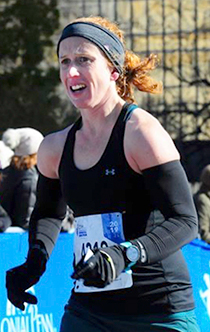Alums Turn National Advocates on Issues That Touch Their Own Lives
As a college athlete, Molly Schroeder ’13 would never have imagined herself having a heart attack at age 21. She was young, in great shape, and about to play an important soccer game. But after returning from a 2-mile run before soccer practice, she knew something was wrong. Schroeder’s brush with heart disease was unexpected at the time, but she was one of the lucky ones. Able to recover with medication within just a few months, she has gone on to share her message of prevention across local and national platforms.
For Jenny Scherer ’10, her running milestones quickly turned into a professional career. Pushing hard resulted in positive gains, and soon she was on her way to training for national events. Eventually she began to sustain injuries, and a teammate calling her out on some unhealthy habits was the wake-up call she needed. Now, Scherer works as a student-athlete specialist at the University of Cincinnati, where she encourages and mentors students through the same potential pitfalls.
Surviving a heart attack  Molly Schroeder ’13 had returned to her dorm room on campus after a light run, and was just goofing around with her roommates when her heart attack symptoms began. “All of a sudden my breath caught. I could feel the blood draining from my face, and I specifically remember feeling that my wrists were numb.” Schroeder’s roommates brought her to a clinic, and an EKG confirmed she was indeed having a heart attack. Doctors discovered that she had a 90 percent blockage. The good news in Schroeder’s instance was that it was a “low-case” scenario. With medication, the blockage was cleared, and she was able to return to her healthy lifestyle.
Molly Schroeder ’13 had returned to her dorm room on campus after a light run, and was just goofing around with her roommates when her heart attack symptoms began. “All of a sudden my breath caught. I could feel the blood draining from my face, and I specifically remember feeling that my wrists were numb.” Schroeder’s roommates brought her to a clinic, and an EKG confirmed she was indeed having a heart attack. Doctors discovered that she had a 90 percent blockage. The good news in Schroeder’s instance was that it was a “low-case” scenario. With medication, the blockage was cleared, and she was able to return to her healthy lifestyle.
But how does a 21-year-old suddenly have a heart attack out of the blue?
Heart disease is so common in the United States, it accounts for roughly 1 in every 4 fatalities. Athletes must be especially aware of their own health history, and be sure they’re practicing safety when it comes to sports. “I was tested for cardiomyopathy when I was 12, since my mom was diagnosed,” says Schroeder. “I did not have the same diagnosis, but the doctors did find a hole in my heart.” Atrial septal defect, or ASD, wasn’t even found on Schroeder’s scan a few years later, so doctors thought perhaps it had closed up. With no real reason to worry, she continued to play sports and eventually fell in love with soccer. Years later in the ER, the doctor looking at the EKG found the hole in the heart again. The symptoms, such as shortness of breath, suddenly began to make more sense.
The good news is that 80 percent of heart disease is preventable. Knowing the signs and taking symptoms seriously can go a long way in increasing your odds of survival. “It all comes down to prevention,” says Schroeder. “Early detection and limiting risk factors are key.”
Schroeder has helped spread this message in a variety of ways. Last year she was chosen to be 1 of 8 women nationally to speak on behalf of the American Heart Association. She has also been on the Today Show and has seen her story featured in publications including Glamour magazine’s article on This Is What It’s Like to Have a Heart Attack at 21 Years Old.
She talks to elementary school kids about the importance of staying healthy. “I feel like I’m still here for a reason, to give something back. Thank God I’m still here, and I can help change the future for someone else.”
Overcoming anorexia In today’s world of social media, the need to keep up – and keep up appearances – is greater than ever. Athletes, especially professionals, are always in the spotlight and expected to absorb every setback. Expectations of self and others can feed into unhealthy habits. Jenny Scherer ’10 ran throughout high school, mostly to stay in shape for basketball and soccer. Running became a passion, but along with it added perfectionism and the drive to do better and better. “In basketball and soccer, generally women are built more solidly. You don’t want to get pushed around. Getting into running – I looked around and felt like I didn’t belong. Runners tend to be more lean, and I started thinking ‘I need to look as lean as I possibly can. I need to lose weight.’ ”
In today’s world of social media, the need to keep up – and keep up appearances – is greater than ever. Athletes, especially professionals, are always in the spotlight and expected to absorb every setback. Expectations of self and others can feed into unhealthy habits. Jenny Scherer ’10 ran throughout high school, mostly to stay in shape for basketball and soccer. Running became a passion, but along with it added perfectionism and the drive to do better and better. “In basketball and soccer, generally women are built more solidly. You don’t want to get pushed around. Getting into running – I looked around and felt like I didn’t belong. Runners tend to be more lean, and I started thinking ‘I need to look as lean as I possibly can. I need to lose weight.’ ”
On the SNC track team, Scherer quickly became faster and started making impressive gains. After graduation, she was offered a professional contract. Even though she had her best ever finish at nationals, she admits she was spiraling. A teammate confronted her, and it was then that she started to work her way back from anorexia and mental illness. “The most important thing to remember is that it’s okay to not be okay. Reach out for help, and be ready to listen to what others have to say.”
It matters more than ever that athletes are talking about their mental health, because they’re in a unique position to influence the next generation. Soon after moving to Minneapolis, Scherer found the Emily Program, a national leader in treating eating disorders. After receiving treatment, she was honored to speak at one of their recovery nights, she says. She has shared her story, How Anorexia Almost Ruined My Running Life, in the pages of Women’s Running magazine.
Scherer also spoke at SNC’s Norby Awards last year, touching on the 10 things she wishes she would have known when encountering her battle with mental illness. “After all the work I put in with therapy, I feel blessed to be able to work with athletes and be a mentor. I really wanted a chance to help and encourage others.”
March 17, 2020











